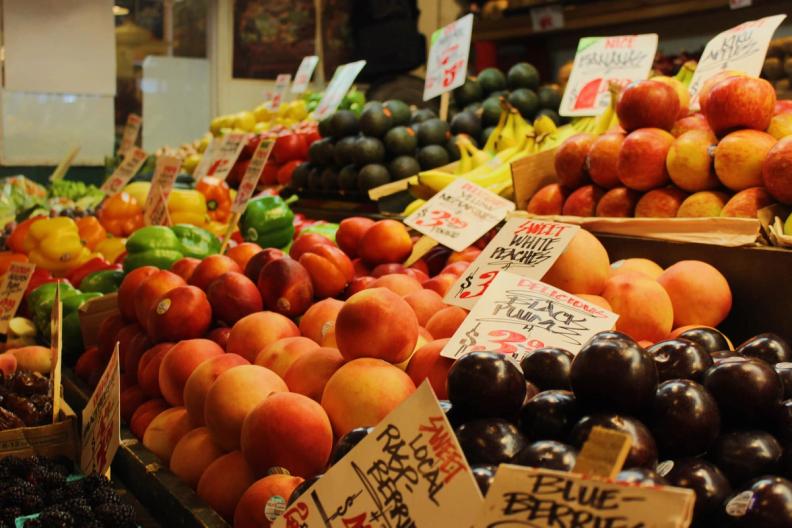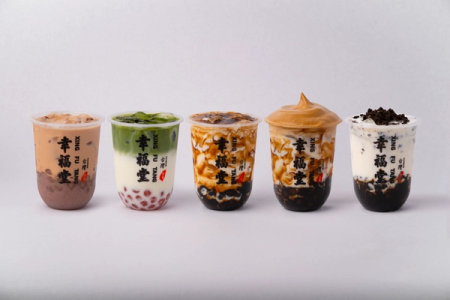An interview with Afresh CEO Matt Schwartz about supply chain food waste solutions.
Q&A With Afresh CEO Matt Schwartz
An interview with Afresh CEO Matt Schwartz about supply chain food waste solutions.
Q&A With Afresh CEO Matt Schwartz

At Too Good To Go, we're always eager to share more background on the many creative solutions being used by sustainable companies to fight food waste. For example, how can optimized demand planning help the planet? That’s where Afresh Technologies is disrupting grocery retail for the better. Afresh Technologies offers grocery retailers an operating system built specifically to help them stock fresher food and reduce waste.
We recently sat down with their CEO Matt Schwartz, to chat about Afresh’s approach to sustainability, the importance of data, and his thoughts on the future of food. Read on below!
You describe Afresh as “the cornerstone solution for fresh.” Can you tell us more about what the platform is and how it works?
Store-level ordering is the most critical function for any grocer, and the amount of food a fresh department orders drives every other workflow and impacts how much they sell. At Afresh, we build AI-powered solutions that are tailor-made to help retail grocery store and corporate teams handle the complexities of fresh food operations. Our products unify disjointed tasks and information, and enable fresh departments to place highly accurate orders that directly result in less food waste while driving profitability for the business, too.
On a technical level, our Fresh Operating System uses artificial intelligence (AI) to anticipate demand and do the extremely difficult math required to order the perfect quantity of bananas, for example, on any day of the week. Grocery store fresh department managers use a tablet to access the Afresh app, which guides them through the ordering process as they count inventory for select items and review order recommendations. Our system links directly with the grocer’s foundational supply chain platforms, eliminating the need for employees to transpose data or access another platform to send and fulfill orders.
Grocery retailers that use Afresh reduce waste by over 25% and see sales increase by 3% on average. It’s results like these that make our platform the cornerstone solution for successful fresh departments.
What was the catalyst that first inspired you to join the fight against food waste?
My career is centered around a desire to have a hugely positive impact on the health of our planet and the health of people. More than any other industry, the food we eat shapes both human and environmental health outcomes, which led me to study the complexity and importance of fresh food, working for nearly a decade at this point to improve our food system.
Despite its clear importance, fresh food continues to be greatly underserved by technology. That lack of attention and innovation creates a cycle of inefficiency and waste, which drives up the cost of food and makes it less accessible. By building the tools to enable a more efficient supply chain, we can minimize waste in our food system and sustainably nourish the world with fresh food.
What is your vision for the future of food?
When I think about the future, I want to see our food system shift toward maximizing nutrition and away from only maximizing calories. Historically, the objective of our food system has been to feed the world enough calories, which hasn’t always been easy to do. And through a series of innovations in the 20th century, ranging from the invention of the Haber Bosch process of synthesizing fertilizer to the Green Revolution, we made it relatively easy to grow and convert row crops into calorie-dense foods that could feed the world.
But now, we’re in a position where people have access to calories but lack the nutritious foods they need. With population growth expected to increase to 10 billion people by 2050 and climate change impacting food accessibility, businesses and organizations need to continue pursuing innovation and leveraging the technology that makes it happen.
At Afresh, we want to help facilitate this change and so we’ve written it into our mission: eliminate food waste and make fresh food accessible to all. If we improve our food system, we have a really great shot at improving the lives of people and the health of our planet.
We’re both taking two unique approaches to realize our shared dream of a world without food waste. What drove Afresh’s innovation around using AI driven insights as a means of reducing waste?
When we started exploring how AI could be used to help solve climate change, we quickly realized that grocery store fresh departments had been deeply underserved by innovation and technology. Nearly all solutions built for critical functions in retail are optimized for non-perishable items that can be ordered automatically and months before their expiration date. Heads of lettuce and salmon filets are much more variable and dynamic than shelf-stable goods, which makes automated ordering systems and existing digital inventory approaches dysfunctional in fresh.
This gap in fresh technology led us to build a fresh-first solution that would enable waste reduction, thereby boosting profitability as well. Since launching with our first customer in 2019, we’ve helped our partners prevent more than 6.9 million pounds of food waste, saving at least 140 million gallons of water and stopping more than 3,818 metric tons of greenhouse gas emissions. With our technology optimizing orders across national retailers like the nation’s third-largest grocer, Albertsons Companies, we’re well on our way to preventing hundreds of millions more in the years to come.
How do you see the awareness of food waste evolving over the course of the next 5-10 years, and how should retailers adapt?
For grocers, there’s a strong incentive to change how they track and think about waste data. Not only is there tangible waste happening with every item that gets tossed, but the labor and resources it takes to grow, ship, order, stock, rotate, and haul them away are wasted, too. Historically, businesses have simply calculated waste by comparing expected profit versus actual profit, which does include food waste, but also counts data from theft and other forms of loss.
Most grocery retailers have no idea how much of their product is actually going into the landfill, but monitoring and tracking food waste will soon be something businesses have to prioritize. California has a new law, which regulates disposal of organic waste, and I expect other states and countries to create regulations that require public companies to report waste data. Deploying solutions that help measure and reduce food waste are pivotal, and technology like Afresh that prevents wadte helps retailers’ profits, too.
With conscious consumerism on the rise, have you witnessed food retailers strengthen their focus on operating more sustainably?
It’s rare to find spaces in the world where conscious consumerism and profitable businesses have nearly 100 percent overlap, and food waste hits that sweet spot. When grocers limit over-ordering and prevent products from going to waste, it benefits consumers who center fresh food in their diets and want to shop more sustainably. While there will always be incentives to increase profitability, there’s still so much more companies can do. It’s been amazing to see a growing allegiance from businesses as they align with the interests of conscious consumers, and I’m really heartened by the conversations and transformations that are happening in these spaces.
Eating fresh food is a delightful experience that provides nutrition that’s essential to our survival as human beings—and it nourishes our souls, too. The individuals who hold positions of power within these pivotal businesses are increasingly seeing sustainability as essential to their success and every food retailer should follow suit.
Building a stronger business and protecting the planet aren’t mutually exclusive. Do you envision more retailers embracing this mindset in the future? What do you think are the best ways to amplify this way of thinking?
At a high level, protecting our planet is ultimately a question of finite resources. Although the Earth is plentiful, we can’t expend all of its resources without accelerating the devastating consequences of climate change that we’re already experiencing. We as humans are quite good at consuming a lot of resources while also wasting a large majority of what we produce. And while efficiency isn’t a very glamorous word, it does serve the interests of businesses, people, and the planet.
Designing tools that combine advanced technological capabilities with a human-centered approach enables us to cultivate a world where the people on this planet can all have access to the fresh, delightful foods that nourish us and provide experiences we crave. And in order to achieve that, we have to focus on areas like food waste reduction, which really move the needle on addressing climate change. Preventing waste is profitable and that incentivizes businesses to do good.
As we launch Afresh into more stores and build new partnerships, we’ll continue to grow our team with passionate individuals who are dedicated to leading with our mission every step of the way. We really are all in this together and I’m proud to say that the solutions we’re building at Afresh are some of the most effective lever arms businesses can pull in the fight against climate change.

